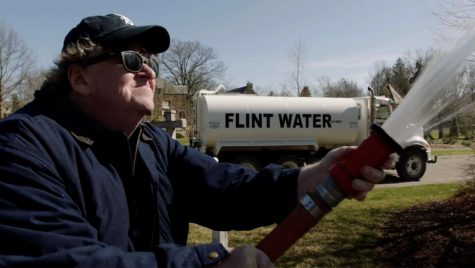“Fahrenheit 11/9” is a well made, but redundant documentary
WSS reviews the latest from Michael Moore which, while well-directed, doesn’t bring a lot of new ideas to the table politically.
October 23, 2018
Thanks mainly in part to Netflix, documentaries have gained a lot of popularity with American viewers. The reasons why are as diverse as the topics that said films can cover. Needless to say, a thirst for truth and for a guiding voice to help us seep through the overwhelming wealth of information that the internet age has brought seems to be the common denominator. And, with as much of the rage and energy that’s being hurled at President Trump in his time in office, this seems to be the perfect time for Michael Moore to swing in with his distinctive style of documentary filmmaking and shed a light on the state of the nation.
The title of the film is a play on his earlier documentary, “Fahrenheit 9/11,” which was made in the wake of the September 11th terrorist attacks. Along with its predecessor, “Bowling for Columbine,” Moore established himself as a bombastic voice on the documentary scene, combining biting leftist critiques of America with his showman-like antics. Both of the films were successes at the time and provided shocking inside looks at our government.

His latest theatrical release is about the 2016 election, what led to Trump getting elected into office and what this means for America going forward. Many of these topics have been discussed nonstop in the past couple of years. This somewhat hinders the film for reasons I will get into later. But externally, the film is well put together and edited. Even with rudimentary material like this, Moore knows what he is doing. The early sequences, in particular, are well put together, such as the opening when he edits together clips that show how sure Democrats were of a victory in 2016. It’s sickeningly ironic to view this portion of the film as a Democrat, but it’s emotionally affecting nonetheless.
Another good sequence, also early in the film, edits together pictures of Trump and his daughter with soundbites of him getting a little graphic when he’s talking about how much he loves her. Again, we’ve heard all of this before, but seeing everything together at once still makes your skin crawl.
Moore also criticizes the media in this portion of the film, pointing out that many of the anchors on the 24-hour news networks that spend all of their time covering Trump, positively or negatively, are no better than he is. They feed his ego by spending so much time covering him, capitalizing off of his victory. Additionally, as he plays interview clips of male anchors attacking Hillary pre-election, he freeze-frames the clips and fills the screen with stats about how many people each interviewer has abused. This is one of the timelier elements of the film and yet it still feels dated because, since it was made earlier this year, more people still have been called out for allegations.
It’s that very point that brings to light the main problem of the film. In a world dominated by social media and 24-hour news networks, is there really a need for audiences to go out to the cinema, and pay to sit down for two hours and get Moore’s two cents on these topics? Much of the film seems dated already, as events that have transpired in the past month alone would be fascinating fodder for a documentary film.

The one portion of the “Fahrenheit 11/9” that almost redeems the film comes early in the second act. Moore shifts his focus to the water crisis in Flint, Michigan that started in 2014 when Rick Snyder switched the city’s water supply, which led to the poisoning of many of the town’s residents. Moore initially conjectures that Snyder’s victory was what lead to Trump’s victory. After that, though, Trump is seldom mentioned and it feels like we’re watching a different movie solely focused on the water crisis. And it works, because this is the portion of the film where we learn the most. While the general audience may be aware of the Flint water crisis, the wealth of information supplied here shows just how successful the government was at covering everything up. Moore’s fiery passion is also extremely evident in this section. This is his state he’s talking about here, and you get the sense that he truly won’t stop until justice is served. But he also knows that this is futile in our society, which is exactly why characters like Snyder and Trump are elected.
The Flint portion of the “Fahrenheit 11/9” could very well have functioned as its own short documentary. You almost get the feeling that this is what Moore really wanted to focus the film on, and that he tied the Trump aspect in later in production.
The bottom line is that the rest of the film is patchy at best. It’s well made, but we don’t really learn anything new. In an era where we have to know that information of this sort is relevant and worth our time, “Fahrenheit 11/9” feels like a bit much. Even at its most enjoyable, in the era of easily consumable news, a documentary this long, about a topic so fervently covered by the media seems overindulgent rather than surprising and provocative.





